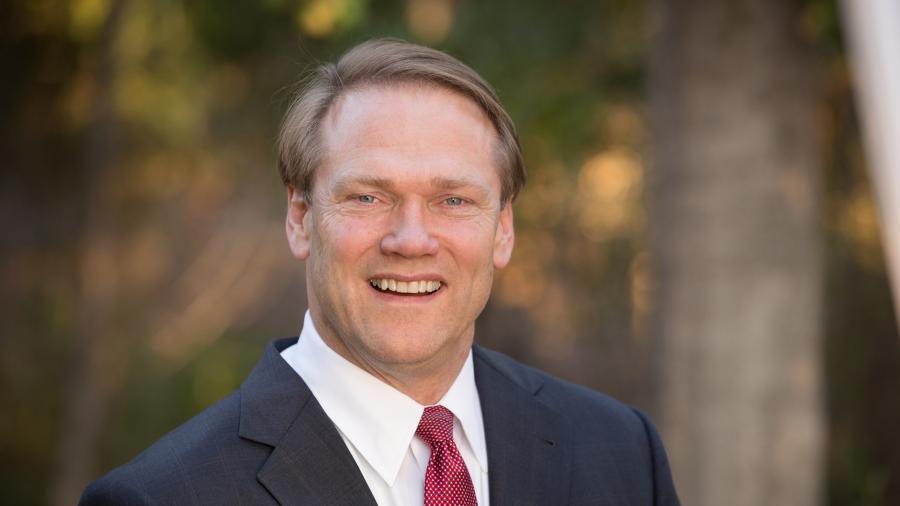Westmont Magazine Seeing Suffering Not as a Barrier but as a Passageway to God

The Thomas Fire and Montecito mudslides give us an opportunity to talk about how we respond to circumstances like these, which have devastated our community. How can we, as followers of God and disciples of Jesus Christ, be great embodiments of his love and mercy in our community?
In Lamentations 3:22-23, the prophet Jeremiah writes, “Because of the Lord’s great love, we are not consumed, for his compassions never fail.They are new every morning; great is your faithfulness.” This passage forms the backdrop of our college hymn and speaks to our capacity to find God in the midst of suffering. It comes not in the midst of triumph but of tragedy. Jeremiah calls us to place our confidence in God as he writes to the children of Israel, who’ve been taken from their native land to Babylon as exiles. They must find God’s purposes while living in a place they didn’t choose with people they didn’t choose for purposes they didn’t choose.
Often life doesn’t go our way—or at least the way we planned. Sheryl Sandberg, the chief operating officer at Facebook, wrote “Lean In,” a book that calls us to find meaning and purpose by pursuing outstanding opportunities. As the book skyrocketed on the New York Times’ best seller list, Sandburg was inundated with more opportunities to travel and speak. As she pursued them, tragedy suddenly struck her life. Out of this reversal of fortune, she wrote her second book, “Option B,” detailing how she responded to the sudden and unexpected death of her husband. This second volume is etched with the pain and humility that confronts each of us if we live long enough and dream big enough.
Life’s hardest realities inevitably touch all of us. Our response to these experiences forms our character as God shapes our ultimate purpose in life. We’re keenly aware of the heartache in our community, and as we marshal the strength to respond, we need to do so with kindness and courage. Kindness brings a gentle touch to those who are suffering, and courage generates the energy needed to help those in distress get through each day.Aristotle once defined courage as the ability to assess each situation with a proper sense of what to fear and what to pursue. Courage is based on discernment and isn’t a blind pursuit of fruitless ends. It’s a willingness to endure hardship and setback to help others who face circumstances that threaten all of us.
Simone Weil, one of my favorite 20th century philosophers, made many observations about evil and suffering. I frequently cite her comment that so often we see suffering as a barrier to belief in God when, in fact, we should see it as a passageway. I first encountered Weil during my own shocking experiences with suffering. I was in my first semester in seminary when my favorite pastor suddenly died. He was the person I wanted to emulate, but he perished in an accident on Mount Hood. Only 32,he left a widow and four children ages 10 to 16 months.
I spent the next five years wondering how we find God in the midst of suffering.As I completed my Master of Divinity and started my own pastoral ministry, I began to reflect on all the ways suffering comes to the righteous and the unrighteous alike. At Princeton, I met Diogenes Allen, who became my thesis adviser and helped me make sense of suffering. He explained that Proverbs sets up a cause-and-effect scenario implying that good things happen to good people and bad things happen to bad people. We come to believe this is the way life should unfold. But God placed Job just a few books away to address why the righteous suffer.In Matthew, Christ says that the rainfalls on the just and the unjust. Throughout Christian history, great saint shave responded to the problem of evil and suffering. Unbeknownst to me at the time, my own father would die unexpectedly seven years later at the age of 60. Although this experience disrupted me emotionally, it didn’t unsettle me spiritually because I had already done the work of coming to terms with suffering.
As one of my favorite Westmont alums wrote recently, “We know God is sovereign and good and can and will make beauty out of the ashes. But we sometimes struggle to trust the wisdom of his plans and accept the transience of life. The fires of our lives at times threaten to consume us, and we can be tempted to run toward bitterness rather than Bethlehem. Yet the witness of souls refined by fire calls us to a deeper truth. By some divine mystery, those who suffer most know God best and possess peace that goes beyond all understanding. God has treasures waiting for us in the darkness and uses the fires of our lives to melt the hardness of our hearts.” May we grasp his great love for us today.